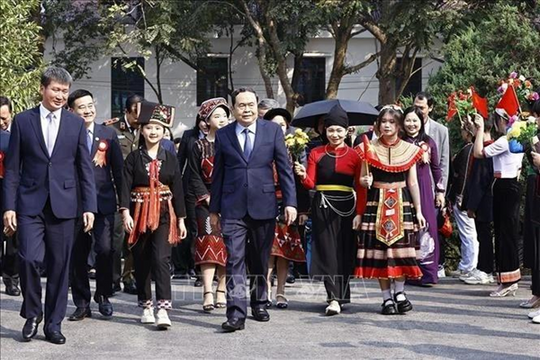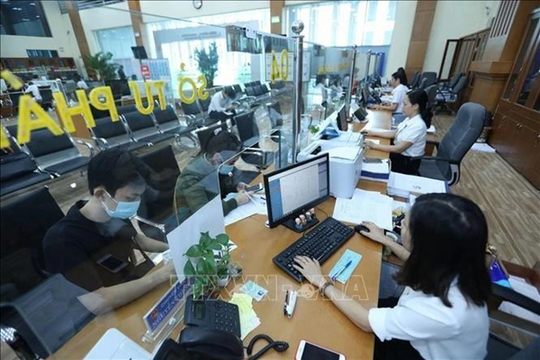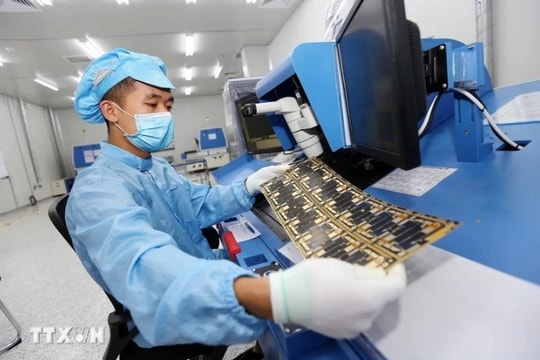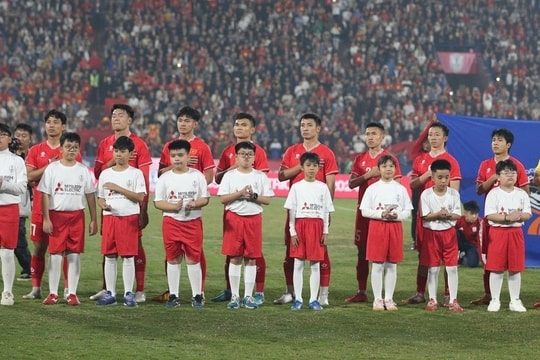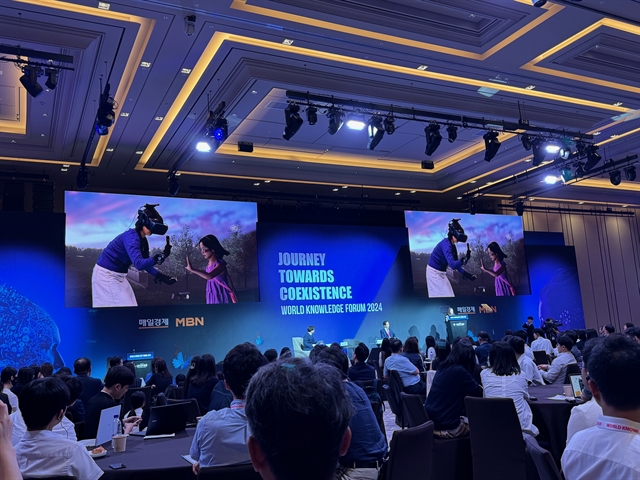 |
| At the session. VNS Photo Thu Vân |
INCHEON — Linda G. Mills, President of New York University, on Tuesday gave a thought-provoking talk entitled "I Love You: The Emotional Conundrum of Artificial Intelligence – A Journey to Coexistence”, in a session on navigating new knowledge in the AI era at the 2024 World Knowledge Forum.
During the talk, she explored AI's profound emotional and ethical dimensions, weaving together personal anecdotes and pressing societal questions to illuminate the complexities of human’s evolving relationship with technology.
Mills began her presentation by recounting a poignant story from a Korean documentary titled “Meeting You”. The film follows Jang Ji-sung, a mother who uses virtual reality to interact with a digital recreation of her late daughter, Nayeon, who had passed away from cancer.
Through AI technology, Ji-sung was able to 'speak' with her daughter and celebrate her virtual birthday. While this technology provided an emotionally intense experience, Mills noted that some psychiatrists have described it as a dysfunctional form of grieving, raising important questions about the psychological impact of such technologies.
“Even the documentary's director said he was unsure whether all of this was ultimately healthy for Ji-sung," Mills said.
"Might it create new ways of coping with complicated grief? Are technologies like AI also something we should be wary of, particularly regarding our emotions?”
She compared the ongoing debate around AI to past controversies surrounding technological innovations.
She recalled how calculators were once feared for potentially undermining students' mathematical abilities, and how cinema and video games similarly faced scepticism before gaining mainstream acceptance.
"The debate continues today," she said.
As a filmmaker, Mills has also witnessed the increasing role of AI within the creative industry. She referenced its use in film production, such as predicting box office success and generating digital environments. One example she highlighted was the Korean drama “Queen of Tears”, where AI was employed to create the background scenery.
She said: “One producer declared that creating this background was beyond human capability. As a viewer, its impact was emotionally extraordinary.
"But as AI technology advances in filmmaking, with the potential for entire movies to be made by AI, there remain significant psychological questions that need to be addressed.”
Reflecting on her career, Mills noted the importance of human connection in her work.
She explained: “I’ve directed several films on difficult topics, including the Holocaust, teen suicide, and the value of interfaith relationships.
"These projects rely on a deep sense of trust between myself and my subjects. Trust that I will understand their perspective. Trust that I will tell their stories faithfully and generously. This trust is built through a uniquely human relationship."
Nevertheless, Mills acknowledged that AI holds tremendous potential for changing the world, citing its impressive contributions across fields such as medicine, history, mathematics, and climate studies. Rather than advocating for or against AI, Mills sought to explore the heart of the matter — the inherent limitations and strengths of machines, the conflict between artificial and emotional intelligence, and the journey toward coexistence.
“I call on all of us to move beyond the superficial pro and con debate, the infatuation or panic. We need to focus on the emotions, the subtext that AI itself does not yet understand. What kind of society do we want in the future? What are the problems we’d like to solve? How do we balance AI with emotional intelligence? What is the journey to coexistence?” she posed to the audience.
The path to coexistence
Looking towards the future, Mills urged a balanced approach to incorporating AI into our lives. She provided an example from the field of psychotherapy, where NYU and the Korea Advanced Institute for Science and Technology are currently seeking funding to develop a robot that could assist school-aged children experiencing difficulties in the classroom.
“With too few social workers available to tend to students' needs, the idea is to provide a struggling child with a companion following a disruptive episode, to help with diagnosis and offer personalised intervention,” Mills explained.
While she acknowledged that such robots cannot replace the human touch provided by social workers, Mills expressed hope that they could offer comfort and support to children in distress, better positioning them for the hard work ahead.
“I believe in many positive ways for the future. The question is, how do we also nurture these other qualities? It’s challenging because we have our heads down, focusing on the future and thinking about what we can achieve with AI and how we can succeed. But the real question is, how do we continue to hold onto the values, virtues, and ability to reflect on those key human instincts?” Mills concluded. — VNS



